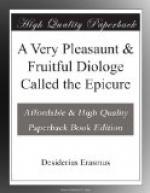too bee spoke then this || saiyng. Spu. Yea,
but all menne wonder and crye out on it, and saye:
it is the voyce of a bruite beast, and not of manne.
Hedo. I knowe thei doo so, but thei erre in
ye vocables of theise thinges, and are very ignoraunt
of the true and natiue significations of the woordes,
for if wee speake of perfecte thynges, no kinde of
menne bee more righter Epicures, then Christen
men liuing reueretly towardes God and ma, and in the
right seruice and worshiping of Christ. SPV
But I thinke the Epicures bee more nerer and
agree rather with the Cynickes, then with the
Christien sorte: forsoth ye Christiens make them
selues leane || with fastynge, bewayle and lament
their offences, and eyther they bee nowe poore, or
elles theyr charitie and liberalitie on the nedye
maketh theim poore, thei suffer paciently to bee oppressed
of mene that haue great power and take many wronges
at their handes, and many men also laughe theim too
skorne. Nowe, if pleasure brynge felicitie wyth
it, or helpe in anye wyse vnto the furderaunce of vertue:
we see playnly that this kynde of lyfe is fardest from
al pleasures. Hedonius. But doo you not admitte
Plautus too bee of authoritie? Speudeus.
Yea, yf he speake vprightely. Hedonius. Heare
nowe them, and beare awaye wyth you the saiynge of
|| an vnthriftie seruaunt, whyche is more wyttier
then all the paradoxes of the Stoickes. SPE.
I tarie to heare what ye wil say. HEDO. Ther
is nothyng more miserable then a mynd vnquiet & agreued
with it selfe. SPE. I like this saiyng well,
but what doo you gather of it? HEDO. If nothing
bee more miserable the an vnquiet mynde, it foloweth
also, that there is nothing happiar, then a mynde
voyde of all feare, grudge, and vnquietnes. SPEV.
Surely you gather the thing together with good reaso
but that notwithstandynge, in what countrie shall
you fynde any such mynde, that knoweth not it selfe
gyltie and culpable in some kynde of euell, HEDO.
|| I call that euyll, whiche dissolueth the pure loue
and amitie betwixt God and manne. SPV. And
I suppose there bee verye fewe, but that thei bee
offeders in this thynge. HEDO. And in good soth
I take it, that al those that bee purdged, are clere:
whych wiped out their fautes with lee of teares, and
saltpeter of sorowfull repentaunce, or els with the
fire of charitie, their offeces nowe bee not only
smalle grefe and vnquietnes too them, but also chaunce
ofte for some more godlier purpose, as causing the
too lyue afterward more accordyngly vnto Gods commaudemetes.
SPV. In deede I knowe saltpeter and lee, but
yet I neuer hearde before, that faultes || haue been
purdged with fire. H. Surely, if you go to the
minte you shall see gould fyned wyth fyre, notwithstadyng
that ther is also, a certaine kynde of line that brenneth
not if it bee cast in ye fyre, but loketh more whiter
then any water coulde haue made it, & therefore it




